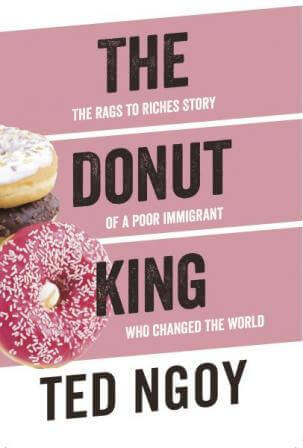
My road to becoming a millionaire started with a trainee badge.
Winchell's was an excellent company to work for. The training curriculum was rigorous, requiring potential managers to perform every job in the factory-like, high-volume donut operation. Each night, I returned home to Suganthini and my family hungry and exhausted.
For $500 a month, I cleaned every inch of the store, handled money, and baked each donut on the menu. I opened and closed, and I did the thousand little things that must be done to keep a store running and customers happy.
My English improved rapidly, and with my experience as a tour guide, I was a quick study learning to deal with customers. I remember the puzzled expressions on the faces of early customers as they strained to understand what I was saying. Like many second-language learners, I could always understand others better than I could express myself, so those early interactions were amusing for both sides. I would say something in my heavy Cambodian accent, and they would take a few moments to parse what I meant. Then they would respond in a slow approximation of English, the kind a good-natured adult might use with a child.
Eventually our interactions began to pick up, both because my skills improved and because my regular customers began to understand my accent. I took great joy in discovering new depths and levels of sophistication in my customers. Baking was another question. If I didn't know a word while in conversation, I could easily skip over it or guess my partner's meaning. But each word in a recipe is crucial, and the timing and measurements must be precise.
Donuts are not particularly difficult to make–you mix dry ingredients in the bucket of a stand mixer, add wet ingredients, and follow the steps. A third grader with a knack for staying on task could handle most of the job, provided someone was willing to help with the backbreaking job of lifting sacks of donut mix and hefting the finished dough onto the cutting table.
But the instructions seemed inscrutable to me at first. Though I excelled at most of the work right away, it took me longer to master baking, and more than a few trays of my early donuts had to be discarded before they reached the shelves, having missed some crucial step in the proofing or baking stages.
The woman who told me about the Winchell's training program had done me a tremendous favor–despite calling me crazy. It was clear after a few weeks of training that without specialized knowledge of the business, there is no way I would be able to set up my own location. At best, I would make several costly mistakes, and at worst I would squander what little money my family and I had managed to save in an endeavor doomed to end in failure.
It was an education not only in donut making but also in the art of appealing to customers
Luck favors the bold, but only if they're adequately prepared. Aside from the specifics of making and selling donuts, there were all manner of small business techniques I had never had to learn in Cambodia, such as balancing books and tallying receipts, handling payroll, managing employee schedules, and paying bills. Thanks to the training program, I learned the business, had a chance to make all the mistakes, and got to take home a salary at the same time.
And there was another benefit to receiving training from Winchell's. Most donut stores at that time were mom-and-pop shops, and the quality of the donuts between one shop and the next varied tremendously. Most shop owners opted to save money by buying inferior ingredients. With few employees–some shops had just two–they chose to bake donuts once in the morning and serve the same batch all day, which resulted in a stale product by the afternoon.
Winchell's was different. The company brought the same efficiency and dedication to making quality donuts that the McDonald's brothers and Ray Kroc originally brought to cooking burgers and fries. The donuts were consistently fresh, which is why customers loved them, and the chain used the highest quality ingredients, keeping prices low by buying in bulk for dozens of stores at a time.
For me, it was an education not only in donut making but also in the art of appealing to customers. I experienced first hand the pride that came with knowing you were offering your customers superior service, and it was always delightful when people took the time to tell me how much they enjoyed a donut I had ushered into existence.
Excerpt from The Donut King: The Rags to Riches Story of a Poor Immigrant Who Changed the World reprinted by permission of Ted Ngoy, Copyright ©2018.
Tidak ada komentar:
Posting Komentar